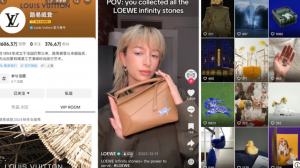Douyin’s hit short drama Love Beyond Words racked up 330 million views.

It’s no secret that China’s short video platforms — which include the likes of Bytedance’s Douyin (TikTok’s China-market predecessor), Bilibili, and Kuaishou — are becoming virtually impossible for luxury brands to ignore. Every day, 600 million use Douyin and more than 300 million Kuaishou, and where both apps initially were simply places for young audiences to kill some time, they’re increasingly becoming places to shop as well. According to the Financial Times, the gross value of all of the goods sold on Kuaishou in the third quarter of this year increased 86 percent year-on-year to RMB 175.8 billion ($27.6 billion).
But in addition to deciding whether to offer some form of e-commerce via short video platforms, luxury brands now need to decide how to best get in front of short video-addicted audiences. One rising trend that brands are increasingly eyeing as a part of their China marketing mix is short-form, largely “vertical” dramas — minutes-long programs that use a vertical format that is conveniently viewable on smartphones. While this trend never really took off in the West, with massively hyped American platform Quibi famously shuttering after just six months, in China they remain more popular than ever. According to Chinese-language media, short dramas on Kuaishou attracted 210 million daily active users (DAUs) in April 2021, with nearly 10 percent of them being “heavy viewers.” Something of a shorter-form successor to the lifestyle dramas that have dominated streaming platforms over the past two years — which have provided luxury brands with marketing opportunities as well as threats of bad PR — short dramas could provide a means for luxury brands to leverage a fast-growing media segment at a relatively lower cost. But these opportunities don’t come without caveats.
Akin to miniature episodic soap operas, short dramas have a relatively long (by internet standards) history in China, with Kuaishou among the first to introduce the format with its 2013 series Never Expected (万万没想到). Yet short dramas took nearly five years to hit their stride, steadily gaining viewer interest over the past three years. In 2020, China’s powerful media regulator, the National Radio and Television Administration (NRTA), began formally including short dramas — which it defined as programs with episodes of less than 10 minutes — under its supervision. Continue to read the full article here





